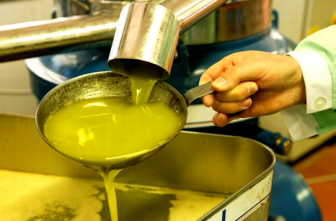
Olive oil producttion
The global food industry and, more generally, agribusiness are rich veins for investigative reporting, which deserve more attention.
For example, “Olive Oil: The Green Gold Rush,” a new report from the Investigative Reporting Project Italy (IRPI), explores “food fraud” in the Mediterranean olive oil industry. It highlights fraud in the way olive oil is produced, distributed and marketed, exposing consumers to the industry’s gross manipulation of a regional commodity.
Cecilia Anesi of IRPI spoke about a pending case against Azienda Olearia Valpesana, one of the biggest olive oil traders in Italy. Last year, four Valpesana executives were arrested on charges including fraud and forming a criminal network. Investigators impounded almost 8,000 tons of the company’s oil.
Anesi and colleague Giulio Rubino joined panelists at the 2013 Global Investigative Journalism Conference (GIJC2013) session “Investigating the Food Industry” to explore some of the ways the industry is being probed by media around the world.
“This [Valpesana case] may be the first time that a fraud scam could result in a really strong punishment,” Anesi says, “possibly leading toward change in the industry.”
The olive oil report is part of “Food for Fraud,” a large IRPI journalistic investigation into fraud in the food market. As part of the investigation, IRPI also investigated tomato puree cans sold at Italy’s Asda supermarkets with the label “Produced in Italy.” The investigation showed the tomato puree had actually been imported from China and was allowed to gain a “produced in Italy” label simply by having some water and salt added and then being canned in Italy.
Though food and agriculture companies may not sound as severe as drug rings or organized crime, Danish investigative journalist Nils Mulvad says journalists digging into food-related topics face an increasingly powerful industry with plenty to hide.
“These are strong companies that often haven’t been as heavily investigated as other industries,” Mulvad says. “It’s our job to uncover lies and explore if they’ve cheated the numbers or are unjustly pushing their views.”
Mulvad runs the farm subsidies database farmsubsidies.org, which tracks the €55 billion the European Union spends per year on farm subsidies. He says the site is designed to be a resource for journalists, as well as inspiration for story ideas.
Moderator Brant Houston, co-founder of the Global Investigative Journalism Network and Board Member of the Midwest Center for Investigative Reporting, says food-related stories can fall into a range of categories.
“Because agribusiness is a vast, global trade, food stories will be stories about business, trade and finance,” he says, “and they may also be stories about energy, environment, labor and exploitation, and corporate sponsored research at major universities.”
“A good place to start,” Houston says, “is asking: where is food going, what is it being sold for, and when is it being tainted?”
 Jessica Weiss reports on this event as part of the IACC Young Journalists Initiative, a network reporting on corruption around the globe.
Jessica Weiss reports on this event as part of the IACC Young Journalists Initiative, a network reporting on corruption around the globe.

